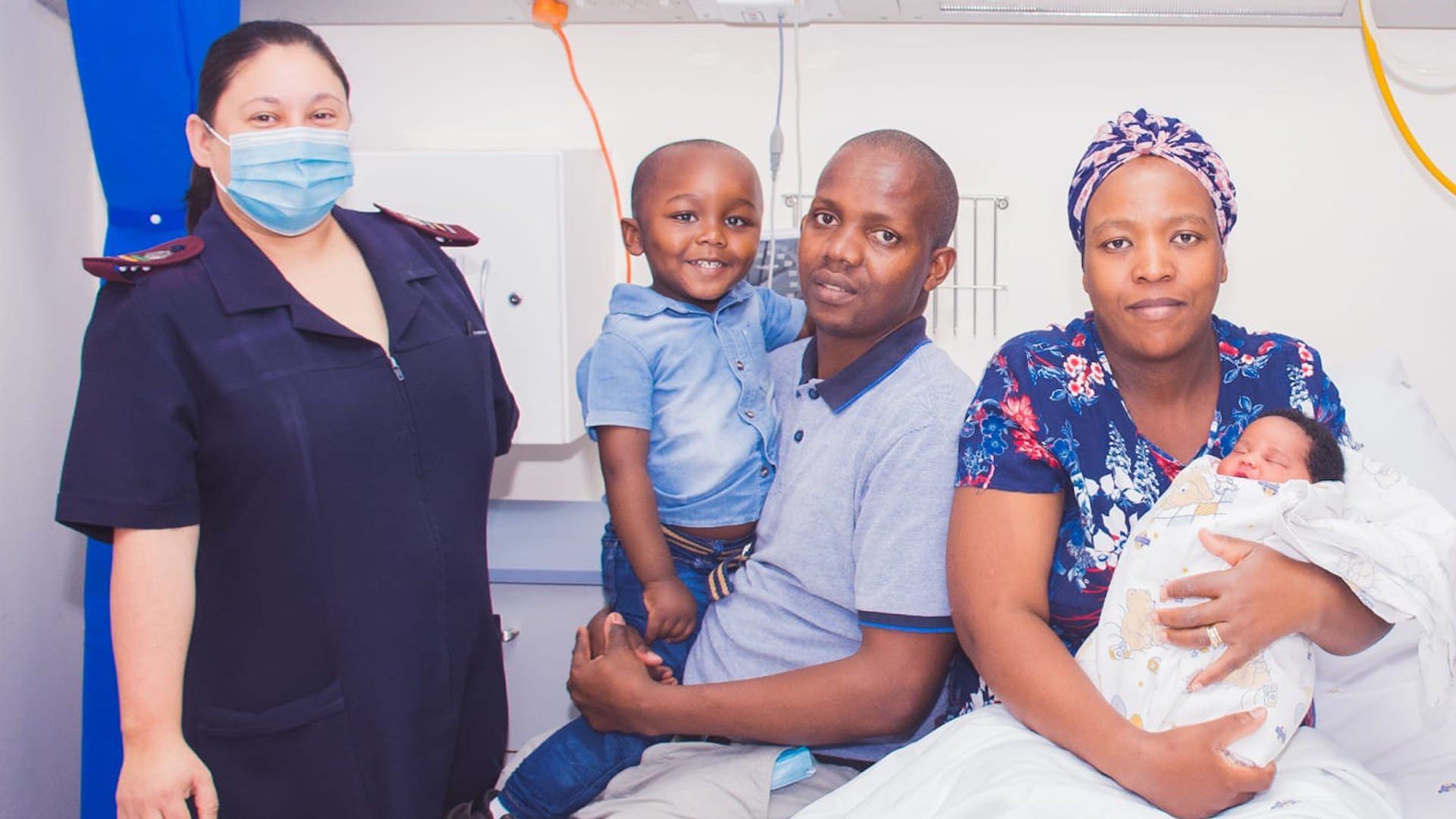Miracle baby gets a baby sister for Christmas
From left to right, registered midwife Sister Tracy Van Niekerk is photographed with a clearly delighted Mihle Biyela who is being held by his father Mr Phiwayinkosi Biyela while his mother, Mrs Ntombenhle Biyela is cradling his new baby sister, Asimdumise.
Mihle visits baby sister at Netcare St Augustine’s Hospital two years after his birth
When Mihle Biyela was born on 12 February 2019 he was hailed a miracle baby by the medical team who safely brought him into the world. On 12 November, two years and nine months to the day, the healthy, happy little toddler was given an early Christmas present – a baby sister.
Recounting the happy event, the delighted father, Mr Phiwayinkosi Biyela says that the family is overjoyed. “We have called our little daughter, Asimdumise, which means ‘Let us praise the Lord’ in isiZulu. Along with our first born, a 10-year-old girl named Ayabonga, our family is now complete.”
Gynaecologist and obstetrician, Dr Bongani Mazibuko who practises at Netcare St Augustine’s Hospital, says the birth of the new addition to the Biyela family was, thankfully, uneventful. “There were some concerns during Mrs Biyela’s two most recent pregnancies, however both children are in perfect health. Best of all, Mihle has not had to undergo any of the many procedures that the medical teams believed he would need at the time of his birth and thereafter.
On top of it he is a bright, happy little boy who can count without any difficulties. His treatment has been conservative and effective, and we are happy that everything has fallen into place beautifully for this young fellow who is now also a proud big brother.”
Saved from a life-threating condition by an advanced in-utero keyhole blood transfusion procedure at 25 weeks while still in his mother’s womb, baby Mihle’s parents could not be happier with the way everything has turned out.
“We were extremely cautious with both Mrs Biyela’s pregnancies and the interventions that we have implemented for the two babies have yielded excellent results. With her most recent pregnancy we were monitoring the pregnancy from the outset and unfortunately Mrs Biyela had to be hospitalised two weeks prior to the delivery of baby Asimdumise, as she had gone into early labour. On delivery day, however, everything went well and Mr and Mrs Biyela now have a bouncing baby girl to complete their family,” recounts Dr Mazibuko.
Mihle’s mother, Mrs Ntombenhle Biyela, says she will always regard her little boy as a “miracle baby” as she had been warned that the foetus suffered from a life-threatening condition known as hydrops fetalis, which was characterised by a fluid build-up around the heart, lungs and other organs, and was unlikely to survive.
“It has been a difficult and painful journey with Mihle, as we were originally warned that the foetus had very little chance of surviving,” remembers Mrs Biyela. “The problems with my pregnancy started only at 24 weeks and fortunately, after it was recommended that my pregnancy be terminated, we sought a second opinion from Dr Mazibuko. He in turn contacted foetal specialist, Dr Ismail Bhorat for assistance.
“We will always be grateful to Dr Bhorat, Dr Mazibuko and their teams at Netcare St Augustine’s and Netcare uMhlanga hospitals. They kept us informed and reassured us every step of the way throughout the treatment and the pregnancy. From thinking that I was sure to lose my baby, to being able to take Mihle home, and seeing him
grow into a bright little boy he has become is the greatest gift I have ever been given.”
According to Mr Biyela, thinking of their experience with Mihle’s healthcare journey brings so many emotions to the fore. “It makes me think of other prospective parents out there who might currently be having a similar challenge and may already have lost hope of welcoming their little ones into the world because of a life-threating condition.”
“I want these parents to know that there is always hope when we have well equipped hospitals with experienced, believing and brave medical specialists like Dr Mazibuko, Dr Bhorat and their teams. If God managed to use Dr Mazibuko and Dr Bhorat to help me and my wife, I do believe that he can also use them to bring hope to other parents and families who might have the same challenge. It is not too late for those parents and families – I would highly recommend that they arrange consultation with these doctors,” he adds.
“Mihle is a very clever little boy,” says his proud mother. “He notices everything, wants to try everything and does not want to fail at anything. He knows all the advertisements and cartoons on television and right now he is applying his mind to speaking English, and he already speaks it well. He also knows the alphabet. I will always thank God for this happy outcome and for the way Mihle has developed.
“During my pregnancy with Asimdumise I became a little worried at 36 weeks, as I was having abdominal pains. The doctor started treatment immediately and I tried not to stress too much. Once again, my husband and I put our faith in God. We also knew that Dr Mazibuko was a good doctor and that we could put our trust in him,” says Mrs Biyela, who originally hails from Nkandla in northern KwaZulu-Natal, and now lives in KwaNdengezi in Durban.
Netcare St Augustine’s Hospital general manager, Heinrich Venter, says that the staff and management of the facility were pleased to welcome the Biyela’s back for the birth of their baby daughter.
“The Biyela’s have become part of the Netcare St Augustine’s extended family. We are deeply thankful that Mihle is doing so well and that he now has a second little sister, who – just like him – was also born here at our maternity unit. We are delighted at the positive outcome and to have played a role in Mihle and baby Asimdumise’s care. We wish the Biyela family all the very best for the future,” concludes Venter.
A brief recap of Baby Mihle’s healthcare journey
Hydrops fetalis can be caused by a variety of underlying conditions, which can result in several potential complications. The prognosis for the foetus is dependent on establishing the exact cause and then treating it early and appropriately. Without this, the condition is almost invariably fatal for the foetus.
The diagnosis of the foetal anaemia was made using advanced sonographic and Doppler techniques investigating the peak flow velocity in an artery in the brain. Baby Mihle was suffering heart failure due to severe anaemia since his heart had to pump harder to get blood to the cells and the heart eventually started to fail.
The medical team performed a life-saving in-utero keyhole blood transfusion procedure called an IUT (intrauterine blood transfusion), when the foetus was only 25 weeks. At the time it was established that the hydrops was not because of immune system problems but was likely caused by a viral infection that had attacked the foetus’ red blood cells, resulting in severe foetal anaemia. Under such circumstances, the in-utero blood transfusion procedure is indicated. Before performing the procedure 1-2 ml of foetal blood is extracted, in a procedure called a cordocentesis, to determine the haemoglobin level of the foetus.
This information is needed to determine the exact volume of blood to be transfused. The foetus immediately started to recover after just a single IUT procedure and suffered no further complications because of the hydrops and continued to develop strongly. Working closely with Dr Mazibuko, the medical team was able to get baby Mihle to a healthy 36 weeks when he could be safely delivered.
The minimally invasive IUT procedure is only indicated in rare cases such as that of Baby Mihle. Hydrops can so easily result in complications and has a mortality rate of some 90%. The procedure itself is intricate, requiring blood to be carefully replaced in the correct volume. A needle has to be guided through ultrasound control into the umbilical cord so that the blood can be sampled for testing, and the blood transfusion can then be undertaken. Complications that can occur are slowing of the heart rate, leakage of blood from the insertion site or clot (haematoma) formation in the cord.

Gynaecologist and obstetrician, Dr Bongani Mazibuko who practices at Netcare St Augustine’s Hospital.













